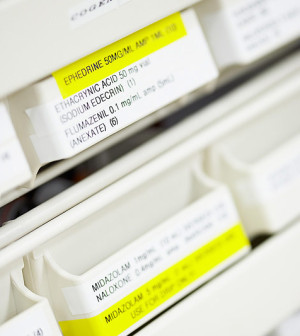- Double Mastectomy May Offer No Survival Benefit to Women With Breast Cancer
- Toxic Lead Found in Cinnamon Product, FDA Says
- Certain Abbott Blood Sugar Monitors May Give Incorrect Readings
- Athletes Can Expect High Ozone, Pollen Counts for Paris Olympics
- Fake Oxycontin Pills Widespread and Potentially Deadly: Report
- Shingles Vaccine Could Lower Dementia Risk
- Your Odds for Accidental Gun Death Rise Greatly in Certain States
- Kids From Poorer Families Less Likely to Survive Cancer
- Tough Workouts Won’t Trigger Cardiac Arrest in Folks With Long QT Syndrome
- At-Home Colon Cancer Test Can Save Lives
Experimental Vaccines May Extend Life in Pancreatic Cancer


Patients with advanced pancreatic cancer, one of the most deadly malignancies, may live a little longer when treated with two therapeutic vaccines, new research suggests.
In a study of 90 patients, this combination approach — GVAX Pancreas vaccine followed by CRS-207 vaccine — improved survival by several months compared with GVAX alone, researchers found. The greatest gain was seen in patients who had at least two doses of GVAX and at least one dose of CRS-207, they noted.
“Average survival was basically double among those who received the combination compared with the control group,” said Stephen Isaacs, CEO of Aduro BioTech of Berkeley, Calif., which makes the vaccines and funded the trial.
Isaacs believes the effect would be even more dramatic for patients given the vaccines in an early stage of the disease.
“I think these vaccines may offer hope to patients in what has been a fairly dismal prognosis due to the severity of the disease,” he said.
Dr. Vincent Vinciguerra, a professor of medicine at Hofstra North Shore-LIJ School of Medicine in New York, said this approach is more targeted than chemotherapy and much less toxic.
“The hope with the vaccine is that you can attack the cancer cells by altering the immune system,” said Vinciguerra, who was not involved in the study.
In the United States each year, more than 45,000 people are diagnosed with pancreatic cancer and upwards of 38,000 die from it. Because it doesn’t cause symptoms right away, pancreatic cancer is often caught late, when it is harder to treat.
In a trial just getting underway, the researchers will compare the vaccine duo against CRS-207 alone in 240 patients, Isaacs said. This data is needed before the U.S. Food and Drug Administration will allow use of the two vaccines in a larger group, he said.
Isaacs said the treatment, if approved, will cost $50,000 or more.
The results of this phase 2 study are scheduled for presentation Friday at a meeting of the American Society of Clinical Oncology in San Francisco.
“This study was remarkable in that it demonstrated an improvement in overall survival and appeared to be associated with very few side effects,” said Dr. Donald Richards, a pancreatic cancer specialist at Texas Oncology-Tyler, a U.S. Oncology Network affiliate.
“The role of immunotherapy in the treatment of cancer is one of the most exciting fields right now in development,” added Richards, who wasn’t involved in the research. “This is one of the first studies in pancreatic cancer to show benefit in a very difficult disease to treat.”
For the study, researchers randomly assigned 90 patients with advanced pancreatic cancer to GVAX followed by CRS-207 or GVAX alone. Almost all the patients had undergone at least one course of chemotherapy before the trial.
The investigators found that patients who received the two vaccines lived 6.1 months, compared with 3.9 months for those who received only GVAX.
After a year, almost one-quarter of those treated with the vaccine combination were still alive, compared with 12 percent of those treated with the single vaccine, they added.
Moreover, patients who received at least three doses of both vaccines and those who received two doses of GVAX and at least one dose of CRS-207 survived an average of 9.7 months compared with 4.6 months for those who received GVAX alone, the findings showed.
Side effects of the combination vaccines were relatively mild and did not get worse with each dose, the investigators noted. The most common side effects were fever and chills.
The GVAX vaccine is made up of pancreatic cancer cells that have been genetically modified to emit a protein that stimulates the immune system. To boost its effectiveness, the vaccine is given with a low dose of a common cancer drug, cyclophosphamide.
The second vaccine, CRS-207, is a weakened form of the bacterium Listeria monocytogenes that is genetically modified so it’s safe for humans but still able to stimulate the immune system.
This combination of vaccines enhances a person’s own immune system and “trains” it to recognize and attack pancreatic cancer cells, the researchers explained.
Data and conclusions presented at meetings are typically considered preliminary until published in a peer-reviewed medical journal.
More information
For more information on pancreatic cancer, visit the American Cancer Society.
Source: HealthDay
Copyright © 2024 HealthDay. All rights reserved.










